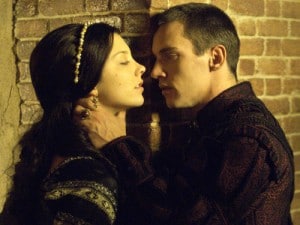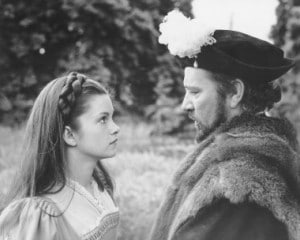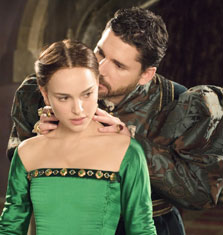 As I stated in my article “The Early Life of Anne Boleyn Part Six – The Château Vert Pageant“, contrary to the scene in “The Tudors”, it is unlikely that Anne and Henry’s eyes met across a crowded room at the 1522 Shrovetide Pageant. It is possible that he did not even notice Anne, who was playing Perseverance. Anne obviously would have noticed her King, but she had just returned to England to marry James Butler and catching the eye of the King would have been the last thing on her mind.
As I stated in my article “The Early Life of Anne Boleyn Part Six – The Château Vert Pageant“, contrary to the scene in “The Tudors”, it is unlikely that Anne and Henry’s eyes met across a crowded room at the 1522 Shrovetide Pageant. It is possible that he did not even notice Anne, who was playing Perseverance. Anne obviously would have noticed her King, but she had just returned to England to marry James Butler and catching the eye of the King would have been the last thing on her mind.
So when did Henry fall for Anne?
Christmas 1524-5
David Starkey1 dates the start of Henry’s feelings for Anne to Christmas and New Year 1524/1525, shortly after he had stopped sleeping with his wife, Catherine of Aragon.
 It was at that time that the Court staged the “Castle of Loyalty” or the Château Blanc pageant in the tiltyard at Greenwich Palace. Starkey writes of how, on the 21st December 1524, St Thomas’s Day, a herald proclaimed in the Queen’s Great Chamber “that the King had given the keeping of the castle… to four ‘Maidens’ of the Court” and that these four maidens had “deputed the protection of the castle to fifteen defenders”.
It was at that time that the Court staged the “Castle of Loyalty” or the Château Blanc pageant in the tiltyard at Greenwich Palace. Starkey writes of how, on the 21st December 1524, St Thomas’s Day, a herald proclaimed in the Queen’s Great Chamber “that the King had given the keeping of the castle… to four ‘Maidens’ of the Court” and that these four maidens had “deputed the protection of the castle to fifteen defenders”.
Although the names of the maidens are not recorded, Starkey believes that one may have been Anne because Thomas Wyatt was listed as a defender, Henry Percy as an attacker and a disguised Henry VIII took part. Starkey writes of how the King “proceeded to thrash his opponents” and “launched such a furious assault” on Anthony Browne, a man who had been resident at the French Court during Anne’s time there, that he “almost cut his poudron [a piece of defensive armour for the neck]”. Was Henry trying to impress one of the maidens? Was he showing that he was more worthy than Percy and Wyatt? We just don’t know.
Whatever the truth about the Château Blanc pageant, Starkey believes that Anne Boleyn first caught the King’s eye during the winter of 1524/1525 because this fits in with George Cavendish’s account of his master, Cardinal Wolsey’s fall and how it was the King’s love for Anne which was the beginning of the end for Wolsey. Although, as Starkey points out, Cavendish is not good at giving dates in his account of what happened, it appears that the King took Wolsey into his confidence in early 1525 and asked the Cardinal to break up the relationship between Anne and Percy. The proposed marriage between Anne and James Butler was used as an excuse, but the truth may have been that Henry VIII wanted Anne for himself. This is what George Cavendish believed because when he writes of “the secret love” which grew between Percy and Anne, he writes that “The which thing [their love] came to the King’s knowledge, who was then much offended. Wherefore he could hide no longer his secret affection, but revealed his secret intendment unto my Lord Cardinal in that behalf; and consulted with him to infringe the precontract between them”2. The King was forced to declare his interest in Anne to prevent her marriage to Percy.
As a result of Wolsey’s intervention in the relationship between Henry Percy and Anne Boleyn, Percy was married off to Mary Talbot, the daughter of the Earl of Shrewsbury, and Anne was sent to Hever Castle, the Boleyn family home where, according to Alison Weir, she “was left to simmer and sorrow… for a year or more”3 before she returned to court to continue her duties as one of Catherine of Aragon’s ladies.
Both Alison Weir and David Starkey write of how the King’s interest in Anne was re-awakened when she returned to court in 1525. Seeing as Mary Boleyn’s son, Henry Carey was born in March 1526, we can assume that Henry VIII was looking for a mistress to replace the pregnant Mary in Autumn 1525. Anne Boleyn was witty, intelligent, sexy, sophisticated and available, and Henry VIII could not help but be drawn to her.
 1526
1526
Anne Boleyn’s main biographer, Eric Ives, dates the start of Henry and Anne’s courtship to Shrovetide 1526 and Alison Weir writes of how Henry VIII wrote out to the Shrove Tuesday joust with the motto “Declare je nos” (Declare I dare not) embroidered on his costume below a picture of a man’s heart engulfed in flames. Henry was declaring that he was in love and it is thought that the object of his affections was Anne Boleyn. Weir also writes of how, in Spring 1526, Henry ordered four gold brooches from his goldsmith: one representing Venus and Cupid, the second of a lady holding a heart in her hand, the third depicting a man lying in a lady’s lap and the fourth of a lady holding a crown. Weir states that “the symbolism was unmistakable”4.
1527
In her book, “The Rise and Fall of Anne Boleyn”, Retha Warnicke writes of how Anne Boleyn turns up in the records in 1527, during the visit of the French ambassadors to Greenwich. According to Warnicke, a French manuscript records how the ambassadors were impressed by her knowledge of France and their language and how, on the 5th May during a visit to see Princess Mary in the Queen’s Chamber, Henry chose to dance with Anne Boleyn while his daughter danced with Viscount Turènne.5
Eric Ives writes of how, in August 1527, Henry VIII applied to the Pope for a dispensation to marry again and although there is no mention of Anne Boleyn the draft dispensation covered a woman who was related to the King in the “first degree of affinity… from… forbidden wedlock”6, i.e. a woman who was the sister of a previous mistress, someone just like Anne.
So, although we don’t know exactly when Henry VIII fell in love with Anne, his feelings were strong enough in August 1527 for him to ask the Pope for a dispensation to marry her. By that time, he was not only besotted with her, he wanted her as his wife and Queen.
In his book, “The Life and Death of Anne Boleyn”, Eric Ives has made a chronology of Anne and Henry’s courtship based on mentions of Anne in the primary sources, events, Henry’s behaviour and the disintegrating marriage of Henry and Catherine of Aragon:-
- 1524 – Henry stops sleeping with Catherine
- 1525, Summer – Henry attempts to build up Henry Fitzroy, the Duke of Richmond and his illegitimate son, as an alternative heir
- 1526, Shrovetide – Henry begins to court Anne
- 1526, Autumn – Henry writes his first love letter to Anne
- 1526, sometime after October – Henry warns Thomas Wyatt off Anne
- 1526, December – Catherine is isolated a court
- 1527, January – Wyatt sent on an embassy to Rome
- 1527, April – Henry consults about annulling his marriage to Catherine
- 1527, Easter – Henry urges Anne to become his “maîtresse-en-titre”, his official mistress
- 1527, May – Secret preliminary hearing of the annulment
- 1527, June – Henry informs Catherine of his plans to annul their marriage
- 1527, Summer – Henry and Anne agree that they will marry
- 1527, August – The decision is made to ask the Pope for a dispensation so that Henry can marry Anne7
Of course, as Ives points out, this chronology is “speculative” because we do not have all of the information, but “it does fit the context as we understand it, and it is psychologically credible”8. We also know that Henry showered Anne with jewel after jewel after jewel in the summer of 1527 and “such a torrent can mean only one thing: Henry and Anne had an understanding – they were betrothed.”9
In my next post on Anne and Henry’s relationship I will be looking at Henry VIII’s love letters to Anne Boleyn.
Notes and Sources
- Six Wives: The Queens of Henry VIII, David Starkey, Chapter 40 “Debut”
- The Life of Cardinal Wolsey, George Cavendish, p48
- The Six Wives of Henry VIII, Alison Weir
- Henry VIII: The King and His Court, Alison Weir
- The Rise and Fall of Anne Boleyn, Retha Warnicke, p56
- The Life and Death of Anne Boleyn, Eric Ives, p84
- Ibid., p90
- Ibid.
- Ibid., p91